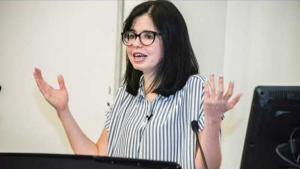The theme for this year’s International Women’s Day (Friday, 8 March) was #BalanceforBetter and we’ve been celebrating across the faculty and University with some fantastic events that celebrated the contribution of women, while highlighting the need for a more gender-balanced world and promoting approaches for reaching a better balance.
Balance for better #diversity – On Wednesday 6th March FBMH E&D team invited Dr Jess wade who spoke about the reasons we need to keep talking about equality. The event held in lecture Theatre B University place to packed audience of staff from across the university.
Dr Jess Wade is a polymer physicist on a mission to change the perceptions of women in science. Over the last few years Jess has been redressing Wikipedia’s under-representation of women and people of colour in STEM subjects, using social media (@jesswade) to highlight inequalities in her field, and campaigning to get the gender-difference myth de-bunking book ‘Inferior’ by author Angela Sani (who presented at last year’s IWD event for FBMH) into as many schools as possible. She is motivated by the simple yet powerful concept: “diverse teams do better science”. Not surprisingly her work in this area (not her day job by the way!) has led to her being named as one of Nature’s 10 people who mattered this year.
Jess presented some compelling evidence that supports the need to maintain conversation’s around gender inequalities of STEM subjects in academia. Diversity in science is a ‘Leaky pipeline’ and in her belief science is failing women. Being a minority in any working environment can have a massive impact on self-confidence, with psychological effects such as imposter syndrome becoming a pervasive problem in STEM subjects. Jess discussed the lack of impact of changes introduced to mitigate gender inequalities such as shared parental leave, where poor uptake and views on shared parental leave are not helping the situation of women in the workplace. Jess raised the uncomfortable subject of conscious bias in peer review, which is having a detrimental effect on the number of women being recognised for their successes and making that essential step to the next level in their career, and that bias in the allocation of funding exists and is another factor that needs addressing to ensure equality for people in their career development.
The ways in which academia has tried to deal with these inequalities are not always helpful either. Jess discussed her feelings of the responsibility of leaders and institutions to make the situation changes. The current model to ‘train the way to diversity (e.g. unconscious bias training for hiring staff), focus’s around changing individuals rather than changing institutional practises. How it is perceived that we can ‘fix this all by making women behave like men’ (e.g. training in assertiveness, confidence and empowerment).
Jess suggested some ways we could tackle the immediate issues:
- Mentoring and networking – Finding someone who will give you the advice you need, maybe not in your immediate circle and not ness in academia.
- Talking about mental health and improving access to mental health support in academia.
- Get better at nominating and awarding women and scientists from other under-represented groups with awards for their achievements.
- Join and build networks – join them and support them not just in your university but wider e.g. Science Girl, 500 women scientists, pride in STEM, 500 queer Scientists.
- Powerful people have responsibility to know the impact of their words and actions can effect junior people. Be not just a mentor but also a sponsor, encouraging talented people and sponsoring.
- And on a personal level – Don’t be afraid! Speak truth to power, and call out rubbish. Jess presented how some recent groups have engendered change, a lot of actions started small but went BIG e.g. #MeToo. Driving structural change in academia will be key to improving equalities in STEM subjects and beyond.
- Amplify women’s and under-represented voices – hear and repeat, and acknowledge what groups are saying to support and amplify their voice. Be a micro-activist from our living room using social media.
The conversation now needs to move away from gender equality – should be equality for all minority and under-represented groups.
Take Home message: ‘Be brave, speak truth to power, amplify female/minority voices, nominate them and cite their achievements!’
If you missed the event you Can catch up on YouTube: Dr Jess Wade talks #BalanceForBetter at The University of Manchester


